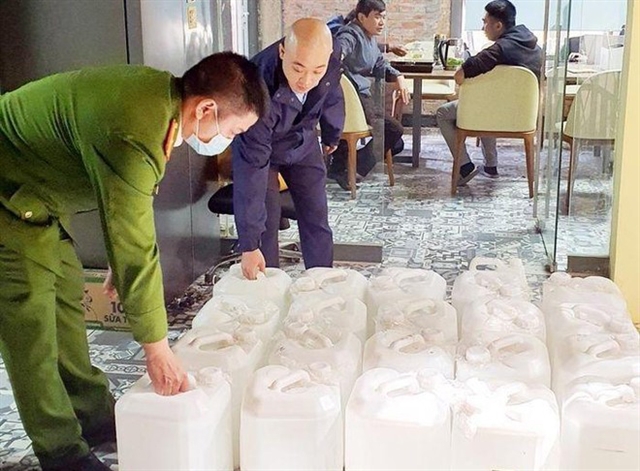Homemade liquor accounts for 70 per cent of unofficial alcoholic drinks, causing an annual loss of US$751 million to the State Budget.

Insiders are concerned that substandard and illegal alcohol has begun to run rampant on the market as Tet is drawing near.
Chu Thi Van Anh, vice president of the Vietnam Beer, Alcohol and Beverage Association, asserts that substandard and illegal alcohol soars in the late months of the year.
By type of drinks, homemade liquor takes up 70 per cent of the unofficial output, doing great harm to consumers' health and causing an annual loss of US$751 million to the State budget.
"Homemade alcoholic drinks, which are of unknown origin and high methanol content, expose serious risks to public health," said Anh.
The vice president calls for tougher measures to end illegal practices in the beverage industry. She also calls for more effective communication strategies to raise awareness of substandard and illegal drinks among consumers.
Nguyen Duc Le, deputy director of the Operation Department, Vietnam Directorate of Market Surveillance, reveals that the production of liquor takes time because it involves multiple steps of distillation.
Unfortunately, some producers have skipped steps to boost production in response to the rising demand for alcohol, resulting in low-quality drinks.
"The producers are churning out liquor without caring about its quality," said Le.
The deputy director also underlines homemade liquor as a matter of great concern since it is the main cause of most recent cases of alcohol poisoning.
He says that homemade liquor dies hard because it is not easy to tell which bottles of homemade liquor are for sale and which are for self-consumption. In Viet Nam, the latter is conditionally legal whereas the former comes with heavy fines.
He also says that the department will step up inspections across the country to crack down on the problem and employ communication strategies to encourage consumers to say no to unofficial alcoholic products.
Nguyen Viet Tan, deputy director of the Science and Technology Department, Ministry of Industry and Trade, calls on Vietnamese consumers to be smart and not be tempted by cheap drinks that would cause serious damage to their health.
"Smart drinking needs to be a part of our culture," said Tan.
Pham Khanh Phong Lan, head of the Food Safety Management Board of HCM City, remarks that alcohol poisoning cases in the city are rising as people consume more alcoholic drinks in the late months of the year.
She says that bad producers normally use industrial alcohol to produce cheap liquor, which is totally unsafe for consumption.
For that reason, the board has had to dispatch many teams to home distilleries for regular checks, but no producer has been caught mixing industrial alcohol with liquor so far.
"We once found a can of industrial alcohol in a distillery but the liquor producer claimed it as a can of hand sanitiser. We could not fine him for using industrial alcohol as hand sanitiser," said Lan.
The head also says that communication holds the key to higher awareness about cheap liquor among consumers. Once they are well-informed about its detrimental effects on their health, they would stop consuming it.
The Environmental Police Department of Ha Noi detected and seized 1,145 litres of homemade liquor in the past few days when they were inspecting several local business households.
One of the households got busted for 510 litres of liquor of unknown origin, which was expected to constitute a fine of VDN37 million ($1,574). — VNS





